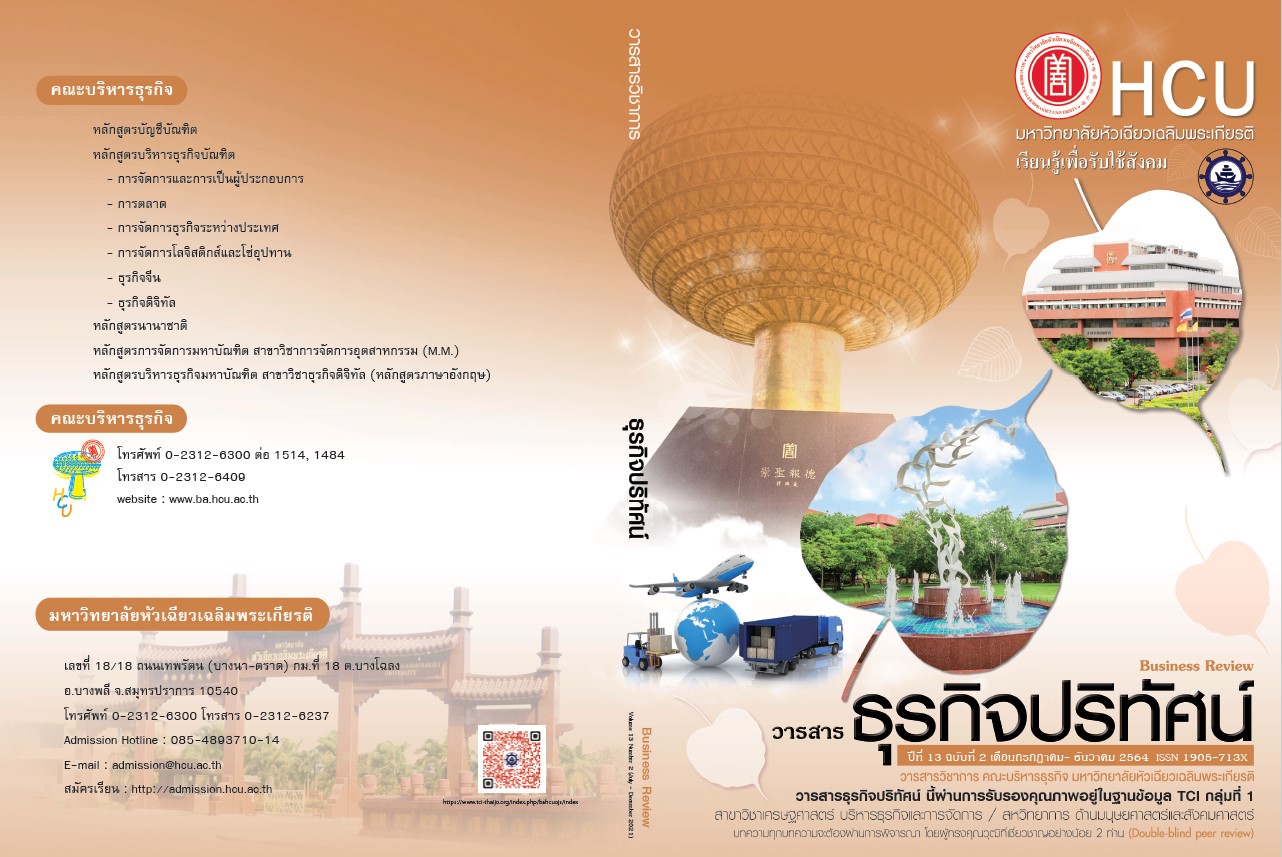The Influence of Perceived Organizational Support and Proactive Personality on Employee Engagement for University Lecturers: The Mediating Role of Self-Efficacy
Keywords:
perceived organizational support (POS), proactive personality, self-efficacy, employee engagementAbstract
The purpose of this paper is to investigate the influence of perceived organizational support (i.e. organization climate, peer support, and supervisor support) and proactive personality on employee engagement. It is hypothesized that the influence of perceived organizational support and proactive personality on employee engagement is not direct. However, it is mediated by self-efficacy. Using a quantitative analysis method, data were collected with questionnaires distributed to 401 university lecturers from both public and private universities in Thailand. The results revealed that perceived organizational support and proactive personality influenced employee engagement. However, the mediating role of self-efficacy on the relationships between perceived organizational support and proactive personality and employee engagement was not significant. The research has implications for lecturer recruitment. Particular behaviors in regard to both groups and supervisors, such as having a proactive personality, focusing on sharing, discussing related problems, and caring about others’ well-being and value, were found to enhance employee engagement.
References
Afzal, S., Arshad, M., Saleem, S., & Farooq, O. (2019). The impact of perceived supervisor support on employees’ turnover intention and task performance. Mediating of self-efficacy. Journal of management development, 38(5), 369-382.
Bakker, A. B., & Demerouti, E. (2008). Towards a model of work engagement. Career Development International, 13, 209–223.
Baldwin, T.T., & Ford, J.K. (1988). Transfer of training: a review and directions for future research. Personnel Psychology, 41(1), 63-105.
Bandura, A. (1997). Self-efficacy: The exercise of control. New York: Freeman.
Bandura, A. (1989). Human agency in social cognitive theory. American Psychologist, 44(9), 1175-1184.
Bowen, J., & Ford, R.C. (2002), Managing service organizations: does having a ‘thing’ make a difference?. Journal of Management, 28(3), 447-469.
Caesens, G., & Stinglhamber, F. (2014). The relationship between perceived organizational support and work engagement: the role of self-efficacy and its outcomes. European Review of Applied Psychology, 64(5), 259-267.
Cropanzano, R., Anthony, E.L., Daniels, S.R., & Hall, A.V. (2017). Social exchange theory: A critical review with theoretical remedies. Academy of Management Annals, 11(1), 1-38
Chen, I. (2016) Examining the linkage between creative self-efficacy and work engagement. The moderating role of openness to experience. Baltic Journal of Management, 11(4), 516-534.
Day, R., & Allen, T.D. (2004). The relationship between career motivation and self-efficacy with protégé career success. Journal of Vocational Behavior, 64(1), 72-91.
Dikkers, J.S.E., Janen, P.G.W., De Lange, A.H., Vinkenburg, C.J., & Kooij,D. (2010). Proactivity, job characteristics, and engagement: A longituditional study. Career development international, 15(1), 59-77
Dragan, D., & Topolšek, D. (2014). Introduction to structural equation modeling : Review, Methodology and practical application. Retrieved September 3,2020, from Researchgate Website: https://www.researchgate.net/publication/267810858
Elsaied, M.M. (2019). Supportive leadership, proactive personality and employee voice behavior: The mediating role of psychological safety. American Journal of Business, 34(1), 2-18.
Emerson, R. M. (1976). Social exchange theory. Annual Review of Sociology, 2: 335-362.
Field, A. (2013). Discovering statistics using IBM SPSS statistics ( 4 th edition ). Los Angeles: SAGE
Frese, M., Kring, W., Soose, A., & Zempel, J. (1996). Personal initiative at work: differences between East and West Germany. Academy of Management Journal, 39(1), 37-63.
González-Rico, P., Carvalho, V.S., Chambel, M.J., & Guerrero, E. (2018). Be well at work, be well outside work: a study with universityworkers. Studies in Higher Education, 43(6),1034-1044.
Guan,X., & Frenkel, S. (2018). How HR practice, work engagement and job crafting influence employee performance. Chinese Management Study, 12(3), 591-607.
Hajdarpasic, A., Brew, A., & Popenici, S. (2015). The contribution of academics’ engagement in research to undergraduate education. Studies in Higher Education,40 (4),644-657.
Harju, L.K., Hakanen, J.J., & Schaufeli, W.B. (2016). Can job crafting reduce job boredom and increase work engagement? A three-year cross-lagged panel study. Journal of Vocational Behavior, 95/96, 11-20.
Haynie, J.J., Flynn, C.B., & Mauldin, S. (2017). Proactive personality, core self-evaluations, and engagement: The role of negative emotions. Management decision, 55(2), 450-463
Ho, R. (2006). Handbook of univariate and multivariate data analysis and interpretation with SPSS. USA: Champman & Hall/CRC.
Ibrahim, S.N.H., Suan, C.L., & Karatepe, O. (2019). The effect of supervisor support and self-efficacy on call center employees’ work engagement and quitting intentions. International Journal of Manpower, 40(4), 2019.
Islam, T., & Ahmed, I. ( 2018 ). Mechanism between perceived organizational support and transfer of training: Explanatory role of self-efficacy and job satisfaction. Management research review, 41(3), 296-313.
Jawahar, I.M., & Liu, Y. (2016). Proactive personality and citizenship performance : The mediating role of career satisfaction and the moderating role of political skill. Career development international, 21(4), 378-401.
Judge, T.A., & Bono, J.E. (2001). Relationship of core self-evaluation traits – self-esteem, generalized self-efficacy, locus of control, and emotional stability – with job satisfaction and job performance: a meta-analysis. Journal of Applied Psychology,86(1),80-92.
Kahn, W.A. (1990). Psychological conditions of personal engagement and disengagement at Work. Academy of Management Journal, 33(4), 692-724.
Kundu, S.C., & Lata, K. (2017). Effects of supportive work environment on employee retention. International journal of organizational analysis, 25(4), 703-722.
Major, D.A., Turner, J.E., & Fletcher, T.D. (2006). Linking proactive personality and the Big Five to motivation to learn and development activity. Journal of Applied Psychology, 91(4), 927-935.
Ministry of higher education, Science,Research and Innovation. (2018). Higher education statistics2018. Retrieved February, 20,2021 From MHESI Website: www.mhesi.go.th
Morrison, E.W., & Phelps, C.C. (1999). Taking charge at work: extrarole efforts to initiate workplace change. Academy of Management Journal, 42(4), 403-419.
Mustafa, G., Glavee-Geo, R., Gronhaug, K., & Almazrouei, H.S. (2019). Structural impacts on formation of self-efficacy and its performance effects. Sustainability,11,1-24.
Pillai, R., & Williams, E.A. (2004). Transformational leadership, self-efficacy, group cohesiveness, commitment, and performance. Journal of Organizational Change Management,17(2), 144-159.
Richman, A.L., Civian, J.T., Shannon, L.L., Jeffrey Hill, E., & Brennan, R.T. (2008). The relationship of perceived flexibility, supportive work-life policies, and use of formal flexible arrangements and occasional flexibility to employee engagement and expected retention. Community, Work & Family,11(2), 183-197.
Rhoades, L., & Eisenberger, R. (2002). Perceived organizational support: a review of the literature. Journal of Applied Psychology,87(4), 698-714.
Saks, A.M. (2006). Antecedents and consequences of employee engagement. Journal of managerial psychology, 21(7), 600-619.
Schaufeli, W.B., & Bakker, A.B. (2004). Job demands, job resources, and their relationship with burnout and engagement: a multi-sample study. Journal of Organizational Behavior, 25, 293-315.
Schaufeli, W.B., Salanova, M., González-romá, V., & Bakker, A.B. (2002). The measurement of engagement and burnout: a two sample confirmatory factor analytic approach. Journal of Happiness Studies, 3(1),71-92.
Sekaran, U., & Bougie, R. (2009). Research Methods for Business. Fifth edition. United Kingdom: Wiley.
Shrand, B., & Ronnie, L. (2019). Commitment and identification in the ivory tower: academics’ perceptions of organisational support and reputation, Studies in Higher Education, pp. 1-15.
Shuck, B., Rocco, T.S., & Albornoz, C.A. (2010). Exploring employee engagement from the employee perspective: implications for HRD. Journal of European Industrial Training, 35(4), 300-325.
Sloan, M.M. (2012). Unfair treatment in the workplace and worker well-being: the role of coworker support in a service work environment. Work and Occupations,39 (1), 3-34.
Wood, R., & Bandura, A. (1989). Social cognitive theory of organizational management. The academic of management, 14(3), 361-384.
Zoller, Y. J., & Muldoon, J. (2019). Illuminating the principles of social exchange theory with Hawthorne studies. Journal of Management History, 25(1), 47-66.
Downloads
Published
How to Cite
Issue
Section
License
All articles published in the Business Administration and Management Journal Review are copyrighted by the journal.
The views and opinions expressed in each article are solely those of the individual authors and do not represent those of Huachiew Chalermprakiet University or any other faculty members. Each author is fully responsible for the content of their own article. Any errors or issues found are the sole responsibility of the respective author.




